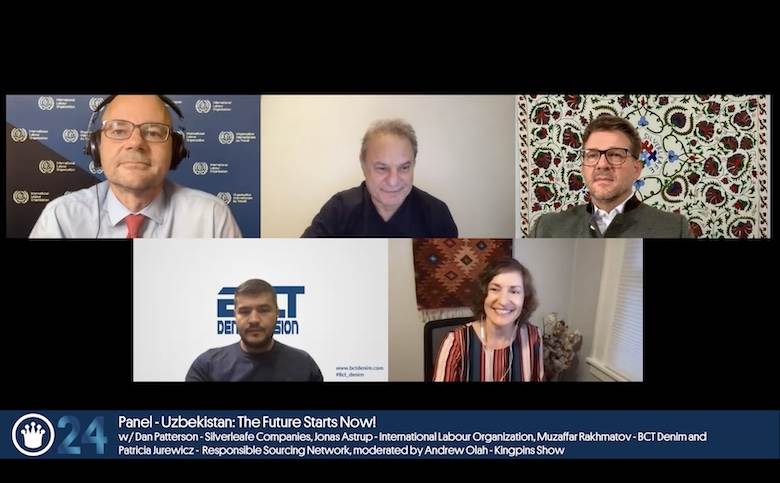Kingpins ponders the future of Uzbek cotton

During one of the final sessions aired as part of Kingpins24 Global, which ran from October 19 to 21, a panel delved into the subject of Uzbek cotton.
Those present on the panel included the International Labour Organization (ILO)’s Jonas Astrup, Responsible Sourcing Network’s Patricia Jurewicz, BCT Denim’s Muzaffar Rakhmatov and Silverleafe Companies’ Dan Patterson.
As host and Kingpins founder, Andrew Olah, commented at the start of the discussion, cotton from Uzbekistan has had little airtime since something of a global boycott formed against the fibre around the year 2006. This was due to reports, officially acknowledged as true by the Uzbek government in 2017, of child and forced labour during the cotton harvest.
The result, as of today, was more than 330 brands (including Zara, H&M and Walmart) signing a petition, led by the Cotton Campaign, against the use of cotton picked in the country. (Ms Jurewicz is also co-founder of the Cotton Campaign.)
As Mr Olah framed it, an “enormous” amount has since changed in Uzbekistan, according to the most recent ILO data for 2020 (the organisation’s data for 2021 will be published in full in February 2022).
Contextualising the cotton situation in Uzbekistan as part of the country’s Soviet-era agricultural legacy, Mr Astrup described how the most recent data the ILO has access to would suggest that around 96% of Uzbek cotton picking now does not involve forced labour.
Acknowledging that forced labour exists “in all countries and in all sectors”, the ILO representative said that based on over 11,000 interviews it has conducted in the country every year since 2013, he could confidently state that only a “small minority” (Ms Jurewicz believed the figure to be around 70,000 individuals) of cotton pickers still experienced “some degree of coercion in the recruitment process” as of last year.
The good news, Mr Astrup said, was that all cotton pickers are paid at least minimum wage and the government-level reforms across the rapidly privatising and liberalising sector have been successful, resulting in a significant decrease in forced labour. Last year, he added, the rate of decrease accelerated even on previous years.
According to the ILO’s most recent report, published towards the end of January 2021, 65% of Uzbek cotton pickers in 2020 were women, with the vast majority from rural areas.
The full discussion is now available to watch in the on-demand section of Kingpins Exchange.










